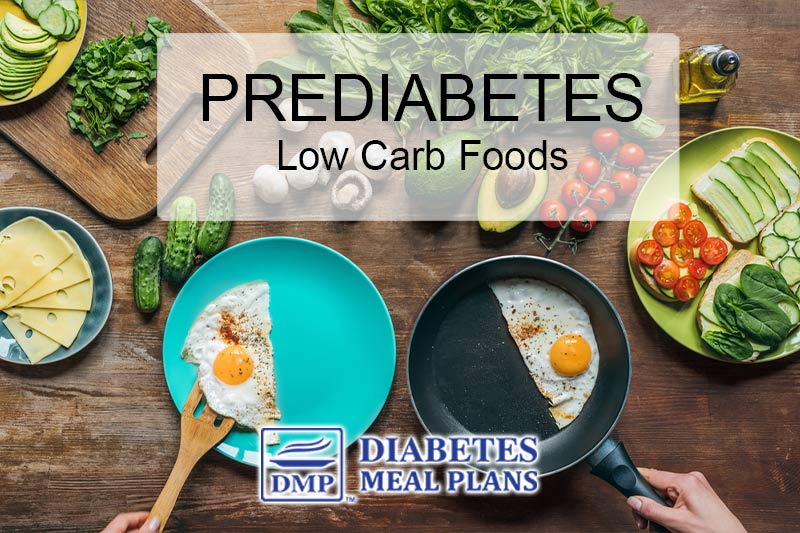Table of Contents[Hide][Show]
We recommend a low carbohydrate diet for people with type 2 diabetes because it has been shown to be effective at lowering blood sugar, boosting heart health, and reducing medication requirements.
Did you know that the same is true for prediabetes? A low carb diet is one of your best defences against increasing blood glucose levels and risk of developing type 2 diabetes.
Hereâs some tips on getting started todayâ¦

Eat to Treat PreDiabetes
The guidelines for managing prediabetes and type 2 diabetes are the same, because theyâre getting to the core of the same issue.
A well-rounded prediabetes diet focuses on healthy fats, hearty proteins, and lots of fibre-rich low carb vegetables.
Healthy Fats
Fat is a macronutrient that is blood sugar stablising as well satiating, so when you eat fats you donât feel hungry again just 30 minutes after a meal.Â
Fats have a minimal impact on blood sugar (plus they taste great), so we encourage you to eat a variety of plant and animal-based fats daily!
Animal Based Fats:
- Beef, pork, and poultry â all contain naturally-derived fats
- Real butter (not vegetable-based homogenated spreads)
- Whole fat dairy (milk and cheese) and unsweetened yoghurt
- Fish, fish oils, and other seafood
- Eggs and the yolks
Plant Based Fats:
- Coconut oil
- Olives and olive oil
- Whole nuts and nut butters (almond, peanut, cashew, etc.)
- Seeds such as chia seeds, flax seeds, sunflower seeds and pumpkin seeds
- Avocados and avocado oil
Protein
Your body needs protein for building and maintaining muscles, soft tissue, and other body structures.
Protein is also a great macronutrient to explore because, like fat, it wonât send you on the dreaded âblood sugar rollercoasterâ like high-carb foods often do. Protein provides stable energy and is known to be satiating (appetitesatisfying).
Fat and protein often go together, so some of these protein-rich foods also contain fat, which is even better.
Animal Based Protein:
- Meat: pork, poultry, lamb, game meats, and organ meats
- Dairy: eggs, cream, yoghurt, and cheese (cheddar, ricotta, feta, cottage)
- Dairy-based protein powder: whey and casein
Plant Based Protein:
- Whole nuts and nut butters: peanuts/peanut butter, almonds/almond butter, walnuts, hazelnuts, pecans.
- Seeds: chia, pumpkin, sesame, sunflower, hemp
- Soy: tempeh, tofu, and edamame
- Legumes: sprouted beans, chickpeas, and legumes (eat these in very small amounts as they are mostly a carb-based food)
- Protein rich veggies: broccoli, mushrooms, Brussels sprouts, asparagus, and more
Fibre Rich Vegetables
Youâll want to fill up half your plate with non-starchy vegetables. These veggies are high in fibre, low in carbs, and rich in vitamins and minerals.
Here is a big list to get you started:
- Alfalfa, artichoke, asparagus, avocado, bean sprouts, beet greens, bok choy, broccoli, Brussels sprouts, cabbage, capsicum, cauliflower, celery, chicory, chives, choy sum, collard greens, cucumber, dandelion greens, daikon, eggplant (aubergine), endive, fennel, green beans, green onions, mushrooms, mustard greens, kale, kohlrabi, leeks, lettuce, okra, pak choi, radish, radicchio, rocket, rhubarb, spring onions, seaweeds, silverbeet, shallot, spinach, snow peas, Swiss chard, tomatoes, turnip greens, watercress, yellow summer squash, and zucchini (courgette).
You can also enjoy one serving per day of low-sugar fruits.
Stick to lower carb fruit options like berries (1/4 to 1/2 cup portions), lemons and limes, and stone fruit like cherries, apricots, and plums (in small portions).
Real, Whole Foods
Whole, unprocessed foods are the most nutritious and donât contain additives, dyes, trans fats, and added sugars.
Whole foods promote whole-body health, plus you actually know whatâs in them!
This is one reason why we encourage people to cook many of their meals at home. Itâs a lot easy to limit sugars and carbs when you get to control every ingredient that goes into a meal.Â
As a general rule, try to limit foods that come in boxes and bags, as well as pre-prepared frozen dinners, fried snacks, and sugary desserts.
Fill up your grocery trolley with crisp, colorful veg and high quality animal productsâ¦leave most other things on the store shelf.
BONUS: Supportive âSuper foodsâ
For an extra boost to your system, focus on anti-inflammatory and antioxidant rich superfoods and beverages.
You can find anti-inflammatory omega-3 fats in oily fish such as salmon, mackerel, tuna, anchovy, sardines, herring, and oysters as well as in chia seeds, flax seeds, virgin olive oil, and walnuts.
For an antioxidant boost, enjoy a warm cup of green tea in the morning instead of a vanilla latte. Green tea contains disease fighting compounds called catechins and polyphenols that can improve blood sugar control, heart health, and even promote weight loss.
For more information, view these low carb guidelines.

